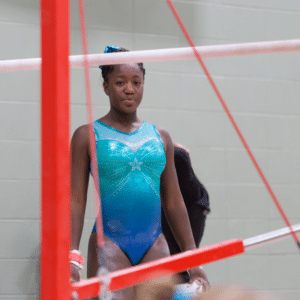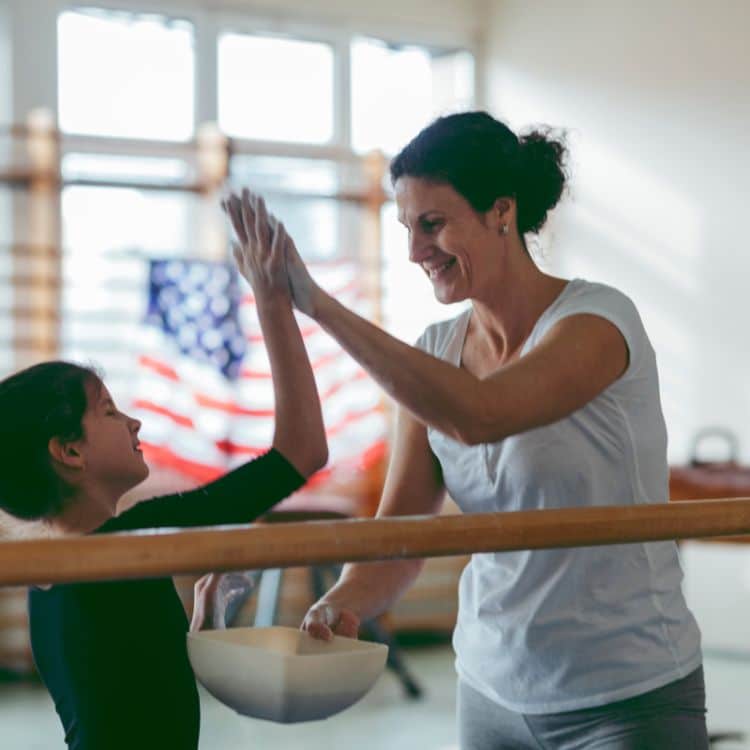Gymnastics is a sport that requires not only physical strength and skill but also mental strength. When a gymnast feels like they cannot attempt a move, even one they’ve performed dozens of times before, it can be frustrating for the gymnast, coach and parent.
So knowing how to get over a mental bock in gymnastics can be a game changer for everyone involved.
In this article, I will share how to tell if a gymnast is going through a mental block and proven strategies that have worked for other gymnasts going through the exact same process.

What is a mental block in gymnastics?
In gymnastics, a mental block happens when a gymnast’s mind stops them from performing a skill they’re already physically capable of. It’s like an invisible wall that stands in the way of a skill they’ve nailed countless times before, causing fear, hesitation, and a complete inability to attempt the skill again.
This isn’t just about feeling nervous or unsure. A mental block is a deeper mental freeze—it’s when the body literally won’t cooperate, even though the gymnast consciously wants to complete the skill. The brain kicks into a “danger mode,” triggering a fear response that can vary from mild hesitation to an absolute refusal to proceed.
Mental blocks are often tied to:
- Anxiety
- Hesitation
- Overthinking
- Panic
- Fight or flight or freeze
The tricky and potentially confusing thing for gymnasts and coaches is that these issues may not always mean a gymnast is having a mental block. Being afraid to attempt a move after a fall is a natural reaction and this can manifest itself in any of the things mentioned above. Therefore it is important to be able to distinguish a true mental block from other more frequent reactions.
Likewise when a gymnast is learning a move for the first time, most will have a heightened sense of fear and nervousness. Again this is to be expected and shouldn’t be considered a true mental block.
Behaviours
Gymnasts will display certain behaviours in certain situations. Gymnasts that appear to display the types of behaviours listed below could be attempting to mask a mental block. The difficulty for coaches and parents is misreading a behaviour and it’s cause.
- Lazy
- Tired
- Unmotivated
- Exaggerating injury
There can be nothing worse for a young gymnast than being labelled lazy when there is something much deeper happening inside their brain.
For gymnasts, mental blocks can feel frustrating and isolating because they want to push forward but feel held back by an invisible barrier that isn’t easily overcome through more practice alone. Understanding this mental component is the first step toward breaking down these blocks and building back confidence in the gym.
The causes of mental blocks
Gymnasts can get mental blocks for several reasons, often tied to the high-stakes, individual nature of the sport and the intense need to continually improve. Here are the main reasons gymnasts experience mental blocks:
1. Fear of Injury or Pain
Gymnastics skills are physically demanding and sometimes risky. Even small mistakes can lead to painful injuries. If a gymnast has had a fall or a close call in the past, their brain may start signaling that a skill is “dangerous,” even if they’ve done it safely many times before. This fear response is the brain’s way of trying to protect them, but it ends up creating a block.
2. Perfectionism and Pressure
Gymnasts are often perfectionists who strive for flawless execution. When they put a lot of pressure on themselves to succeed, they can become overly cautious, fearing they’ll mess up or won’t perform perfectly. This stress can cause a block because they’re so focused on not making a mistake that it disrupts the natural flow of their movement.
3. Overthinking and Loss of Muscle Memory
Overthinking each movement can interfere with muscle memory, the automatic ability to perform skills without consciously thinking about each step. Mental blocks often start when gymnasts get “stuck in their head,” analyzing every aspect of their technique, which interrupts the natural flow of their movements and creates hesitation.

4. Loss of Confidence or Trust in Their Abilities
A tough practice, a series of falls, or even seeing other gymnasts struggle can shake their confidence. If a gymnast begins to doubt their skills or their physical ability, they might feel uncertain when attempting a move, even if they’ve done it successfully many times before. This lack of trust in their body’s ability to perform the skill can make it feel impossible to execute.
5. External Pressure
Pressure from coaches, parents, or the weight of upcoming competitions can sometimes push gymnasts to a breaking point. When they feel they have to perform perfectly for others, they may start to tense up, making it harder to perform a skill with ease. This can create a block if they’re more focused on meeting expectations than simply trusting their training.
6. Comparisons to Others
Watching teammates or competitors can sometimes be discouraging if they perceive others as better or more capable. Constant comparisons can lower self-esteem and make a gymnast feel inadequate, adding mental pressure and making blocks more likely.
Strategies to avoid mental blocks in gymnastics
Avoiding a mental block requires a combination of mental and physical preparation. The following strategies can help you build your confidence and perform your best.
Visualization
Visualization is a mental rehearsal technique that can help you prepare for competitions and improve your confidence. By visualizing yourself performing your routines flawlessly, you can create a positive mental image of success and increase your confidence.
To use visualization, find a quiet place where you can focus and imagine yourself performing your routine perfectly. Use all of your senses to create a vivid mental image of yourself succeeding.

Goal Setting
Goal setting is an important part of improving your confidence and performance in gymnastics. Set realistic, achievable goals that are broken down into short-term, medium-term, and long-term goals. This will help you stay motivated and focused on your progress.
When setting goals, make sure they are specific, measurable, achievable, relevant, and time-bound (SMART). This will help you stay focused and motivated to achieve your goals. If a goal is set that is unrealistic it will damage confidence even if it sounds wonderful.
An example of a SMART goal would be “Improve my Beam Routine difficulty value by 1.5 before the end of the season.”
There may be several ways of achieving this either by up-leveling a specific skill or by creating a new combination of skills. This also takes away the pressure of having to master one specific skill especially if it is a skill that causes particular worry.

An example of a non-SMART goal would be “get better at beam”. How is that measured and by when? You don’t want to leave your goals down to a subjective opinion. One person may say that yes, you have got better at beam but another may disagree. If it’s a SMART goal like the first example, there can be no argument as to whether you achieved it or not.
Self Talk
Self-talk is the act of talking to yourself either aloud or in your head. It is a powerful tool that can help improve your mental focus and boost your confidence in gymnastics.
To create a list of cue words that have significant meaning and value, start by identifying the negative self-talk that you may engage in. Then, replace those negative phrases with positive ones. For example, instead of saying “I always mess up on the beam,” say “I am confident and strong on the beam.”
Here are some of my favorite gymnastics quotes to help inspire you with self talk!
Focus on Things You Can Control
One of the most important aspects of mental focus in gymnastics is to focus on things that you can control. It is not helpful to worry about what others are doing and compare yourself to others. Instead, focus on what you can control in training sessions and competitions. This may include things like your technique, form, and mental preparation. By focusing on these areas, you can build self-confidence and develop a winning mindset.
At meets, this is particularly important. Try and put together a routine you are comfortable with every time you go to a meet. Stick to your routine and focus on those things only. For example, putting certain things in your bag, having a certain playlist that you can listen to, or having a set warm-up routine.
This will all help you ignore the things out of your control like what other gymnasts are doing or worrying about which skills they are competing.
Why is Focus Important in Gymnastics?
In gymnastics, mental focus is critical for achieving success. Being focused means being able to concentrate your attention on the task at hand and tune out distractions. This is important in gymnastics because even the slightest lapse in concentration can result in a mistake, injury, or poor performance.
To stay focused during training sessions, there are several things you can do. First, set clear goals for each session and focus on achieving those goals. Second, use visualization techniques to mentally rehearse your routines and perfect your technique. Third, take breaks when needed to recharge your focus and energy levels.
At meets, distractions can come from the crowd, other gymnasts, or noise. To avoid these distractions, try wearing noise-canceling headphones or earplugs. Also, develop a pre-competition routine that includes visualization, deep breathing, and positive self-talk. This routine can help you stay focused and mentally prepared for your routines.
Why is confidence important in gymnastics?
Confidence is a key factor in gymnastics because it can affect your performance in many ways. When you are confident, you are more likely to take risks and push yourself to your limits. You are also more likely to recover quickly from mistakes and maintain a positive attitude, which can help you bounce back from setbacks.
On the other hand, when you lack confidence, you may feel hesitant or afraid to try new skills or push yourself too hard. This can limit your progress and hold you back from reaching your full potential.

Self-Confidence in gymnastics
Self-confidence is the belief in your abilities and potential to succeed. In gymnastics, self-confidence is important because it can help you perform your best under pressure. When you believe in yourself and your abilities, you are more likely to take risks and perform at your highest level.
One way to improve your self-confidence is to focus on your strengths rather than your weaknesses. Make a list of your accomplishments and skills you are confident in, and remind yourself of these strengths when you are feeling unsure.
Confidence v arrogance
Confidence and arrogance are often used interchangeably, but they are actually very different. Confidence is a positive trait that is rooted in a belief in your abilities, while arrogance is a negative trait that is rooted in a belief that you are better than others.
In gymnastics, it is important to have confidence without crossing the line into arrogance. Being confident means believing in your abilities and potential while being arrogant means looking down on others and believing you are better than them.
The Mental Game makes the difference
In modern gymnastics, many gymnasts and coaches have access to the same knowledge and training methods. As a result, the mental game is becoming increasingly important. The ability to stay focused, confident, and mentally tough can be the difference between winning and losing.
To improve your mental game, it is important to focus on the strategies that work best for you. The following tips can help you improve your confidence and focus in gymnastics.
Conclusion
In conclusion, Mental Blocks are common in gymnastics. If you are a gymnast and are worried that you may be developing a mental block, it’s important to talk to someone whether it be a parent, coach or someone that can help guide you through a potentially difficult time. Remember that you are not alone in dealing with this.
By focusing on things that you can control, developing self-confidence, and using positive self-talk, you can improve your mental strength and work through it.
FAQS
How can I be mentally strong in gymnastics?
Being mentally strong is often linked to confidence. To improve your confidence use strategies like goal setting, visualization or self-talk. Once you are successful at something you will become more confident and mentally stronger.
Does gymnastics affect your mental health?
As with any sport, gymnastics can affect your mental health in both a positive and negative sense. This shouldn’t put you off starting the sport but if you feel like it is affecting you always try to speak to someone about it.
How do I get my confidence back in gymnastics?
Being resilient helps gymnasts whose confidence has dropped. Every gymnast will have periods in their career where they struggle with something for example an injury, a tricky move or a mental block. By continuing to put effort into training and not giving up, a gymnast is being resilient and this will hopefully lead to an improvement in confidence.
- How to Do a Back Handspring: Complete Step-by-Step GuideLearning how to do a back handspring is an exciting milestone for any gymnast. It builds confidence, agility, and forms the foundation for advanced tumbling… Read more: How to Do a Back Handspring: Complete Step-by-Step Guide
- How To Get Over a Mental Block In Gymnastics: A Complete GuideGymnastics is a sport that requires not only physical strength and skill but also mental strength. When a gymnast feels like they cannot attempt a… Read more: How To Get Over a Mental Block In Gymnastics: A Complete Guide
- The Best Leotard for Girls in 2025: What to Look ForFinding an ideal leotard for girls isn’t just about picking a dazzling design that sparkles (although it does help!). The leotard has to fit perfectly,… Read more: The Best Leotard for Girls in 2025: What to Look For
- The Best Gymnastics Shorts (Our Top Picks)The best gymnastics shorts are designed to be worn over the top of a leotard providing additional coverage around the upper legs, whilst allowing gymnasts… Read more: The Best Gymnastics Shorts (Our Top Picks)
- Decathlon Leotards – Are They Any Good?If you’re in the market for a new leotard, you may be wondering if Decathlon leotards are any good considering the low cost of their… Read more: Decathlon Leotards – Are They Any Good?
- A Complete Guide to Gymnastics Hand RipsAre you tired of dealing with painful gymnastics rips on your hands from training? Look no further – this article offers a comprehensive approach to… Read more: A Complete Guide to Gymnastics Hand Rips






